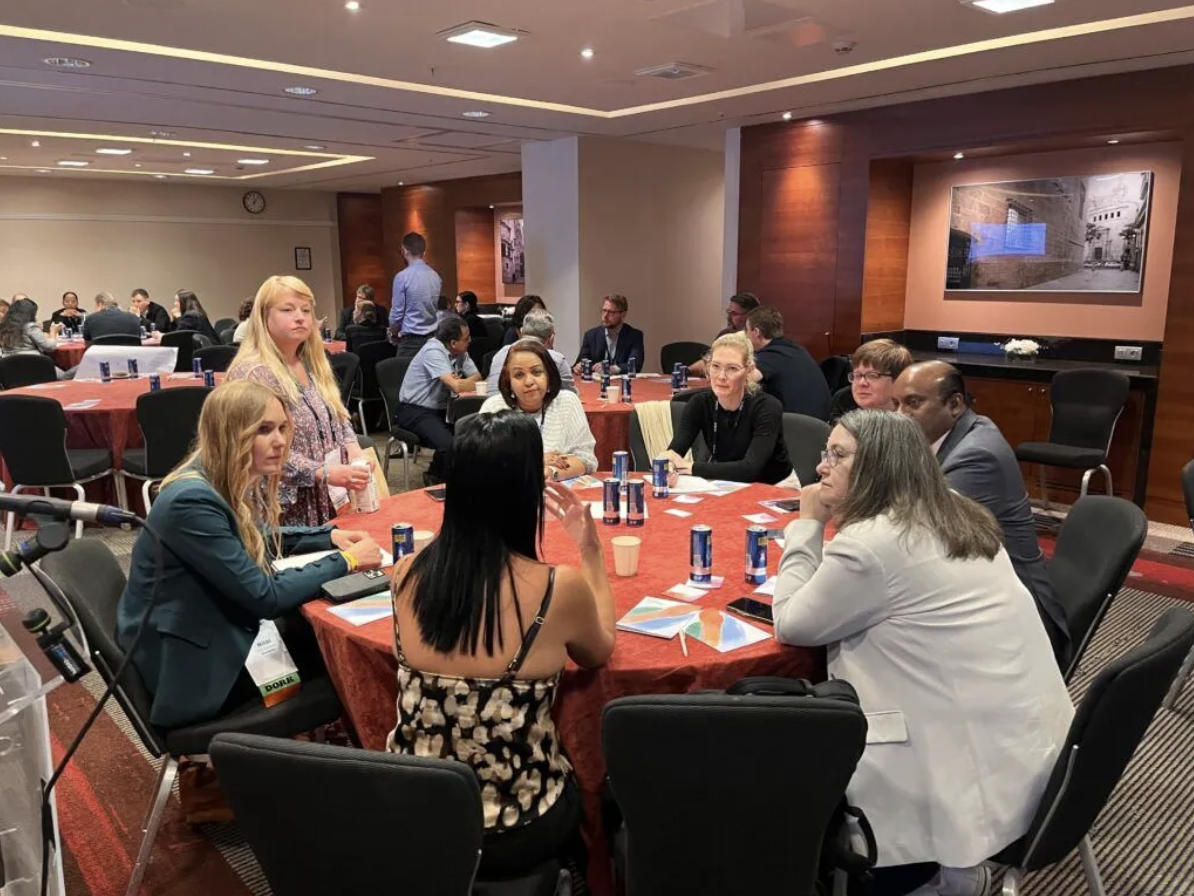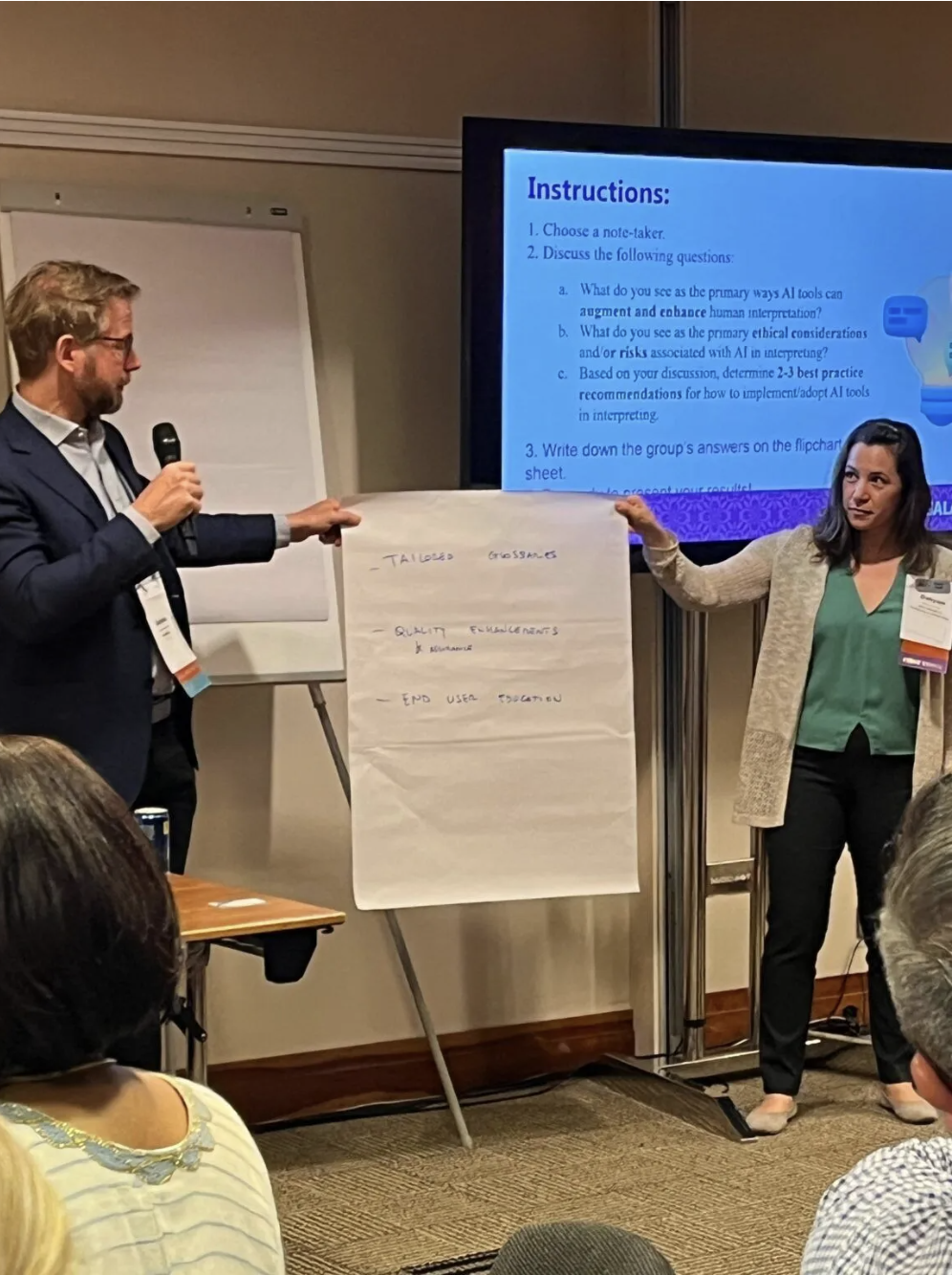- Home
- Resource Center
- Articles & Videos
- Navigating the Future of AI in Interpreting: Insights from GALA 2024
14 May 2024
Navigating the Future of AI in Interpreting: Insights from GALA 2024
At this year’s Globalization and Localization Association (GALA) conference, a hub for leaders in the language industry, Boostlingo led an engaging workshop titled “Ethical AI in Interpreting: Harmonizing Technology and Human Values.” This session brought together industry experts to explore the strategic integration of AI with the nuanced demands of interpreting.

The workshop centered around three areas
1. AI as a Supporting Tool
Participants identified several ways AI can augment and enhance human interpreting services, including improving efficiency and accuracy, providing vocabulary and terminology support, offering cultural information, and aiding in training and development. Crucially, they stressed that AI should empower rather than replace human expertise. Proper training on how to use AI tools effectively was identified as essential for maintaining core interpreting skills.
2. Additional AI Opportunities
Attendees explored additional AI applications in interpreting. These included voice cloning for message relays in medical settings and AI-assisted follow-up appointments. The potential for routine communication tasks, like scheduling, and support features like sentiment analysis and AI-powered note-taking were also discussed.
3. Ethical Considerations and Risks
The conversation also covered potential risks associated with AI in interpreting. Concerns included data security, privacy, compliance issues, increased cognitive load for interpreters, loss of nuanced communication, and the potential blurring of lines between translation and interpreting when both are platform-based. Participants stressed the importance of clearly identifying when AI is being used and defining “low-risk” situations where AI might be appropriate.
Best Practice Recommendations
The workgroup discussions led to several best practice recommendations:
- Developing decision trees to assess the feasibility of AI tools based on factors such as fit for purpose, ethics, accessibility, budget, and tool alignment.
- Educating all stakeholders on expectations, proper disclaimers, best practices for usage and outcomes, and risk assessments
- Creating tailored glossaries for different types of interpreting assignments
- Implementing quality enhancement measures
- Exploring hybrid models that combine AI with human interpreters for checks and balances
- Utilizing AI in other business processes to increase efficiency beyond interpreting
- Determining appropriate pricing models for AI-supported services

Conclusion
Takeaway
The interpreting profession has absorbed the emergence of AI as a disruptive technology that offers both opportunities and risks. The industry is now entering a phase of identifying, on a more granular level, which opportunities companies and stakeholders want to address and how to create decision-making processes appropriate for individual use cases. This involves understanding the potential risk of harm to end users and liability exposure and how AI can improve processes and support interpreters and interpreting processes.As the field moves forward, we hope to see continued formalization of its approach to adopting AI, ongoing tracking of emerging and evolving legislation and guardrail policies, and systems for monitoring the impact of implementation.

Katharine Allen
Director, Language Industry Learning. Katharine has been in the language services space for over 30 years. An interpreter, trainer, university instructor, advocate, author and public speaker, she has held many positions in the field over the years. She co-founded and was co-president of InterpretAmerica from 2010-2020, where she worked to raise the profile of interpreting and advocate for our profession. Katharine joined Boostlingo in the summer 2022 and serves as the Director of Language Industry Learning

Caroline Remer
VP of Language Operations. Caroline has been in the language interpretation space for more than 13 years as a Spanish interpreter and with Boostlingo since May 2018. She has been fortunate to be able to live abroad most of her educational career, doing her undergrad at sister school of USF, Universidad de Deusto in Bilbao, Spain, studying international relations and Spanish. She finished her Masters in Peace, Conflict and Development Studies in 2015 at UNESCO sponsored Universitat Jaume I in Castellon de la Plana, Spain, where she finished a 200-page dissertation translated into Spanish and English regarding the power of food in creating intercultural dialogue. Caroline moved back to her hometown of San Francisco in 2015 after finishing her studies and entered into the Social Work field, working as part of a care team to serve low-income, Spanish-speaking older adults. After transitioning from the Social Work field, she found Boostlingo where she manages a robust network of Professional Remote interpreters, ensuring quality, advocating and promoting career development for interpreters, and hosting a myriad of social media efforts and webinars for remote interpreters. As an interpreter herself, she loves working with and promoting the role of the interpreter both in a patient’s care team and in every facet of life.


